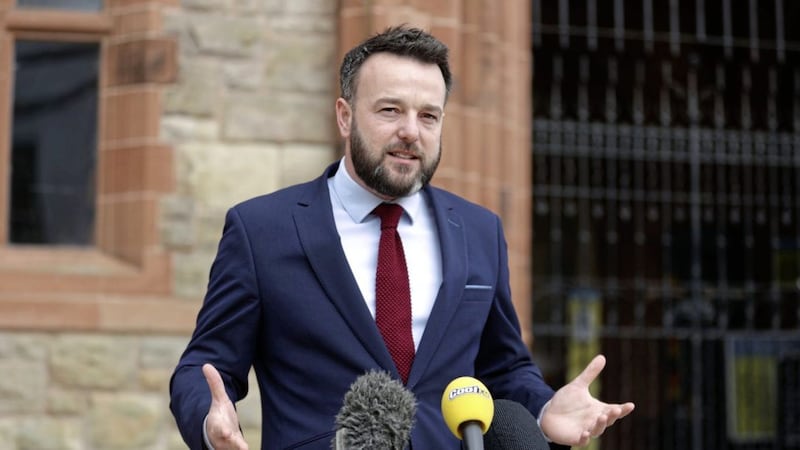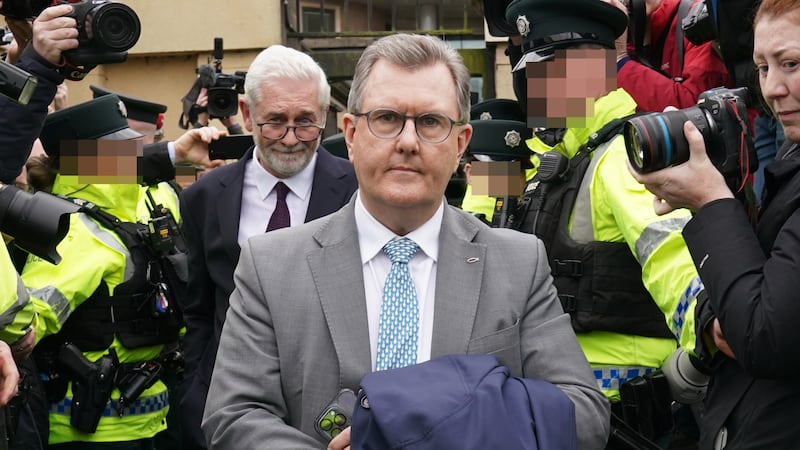As Colum Eastwood marks five years as SDLP leader he tells political correspondent John Manley about the challenges of creating a new Ireland and dealing with instability in the Stormont institutions and beyond.
WHEN Colum Eastwood succeeded Alasdair McDonnell as leader of the SDLP five years ago, many suspected the then 32-year-old was naive, and that despite a youthful energy, his ambitious project of change would falter.
The party was 17 years on from the Good Friday Agreement, its political highpoint, and in the intervening years had been steadily sliding electorally, eclipsed by Sinn Féin as the voice of northern nationalism.
The political stability he hoped for as he assumed the leader's role failed to materialise as he was plunged in what has been an almost unrelenting cycle of elections and political upheaval. There has been an EU referendum, Stormont’s collapse, a local government election, two assembly elections, and two Westminster elections, the first of which in 2017 saw the SDLP lose its three MPs, all of them previous party leaders. It was a bleak scenario and by Mr Eastwood’s own admission an “existential crisis” for the party that turned 50 this year.
The SDLP maybe needed to hit rock bottom before its fortunes changed but last December saw the party experience its first upturn in a Westminster election for more than two decades, securing two seats in Foyle, his own constituency and for Claire Hanna in South Belfast.
It has put a spring not only in the party leader’s step but across the SDLP ranks. It lost three of its leading figures in the past 12 months – Seamus Mallon, John Dallat and John Hume – but the talk is not of a curtain call but of rejuvenation instead.
Speaking to The Irish News from Westminster, the Foyle MP is keen to stress the presence of new blood, a trend he insists will be reinforced at the next assembly election, scheduled for little over 18 months’ time.
“I think we’ve shown people we are back in the game,” he says.
“This year has been a time to reflect on the party’s legacy but it’s now time to talk about the future and the next generation.”
He argues that the current circumstances, destabilising as they are at times, offer “massive opportunities” to advance the nationalist cause. However, with that comes a “fairly big burden on those of us that want to change to get it right”.
The SDLP leader remains consistent in his opposition to a border poll in the short-to-medium term: “Don’t obsess about the date, obsess about winning and how you actually do that.
“Winning has to mean so much more than a referendum – it has to mean a societal change and that means you have to create a vision for the future and a country that people can get excited about, particularly young people.”
He argues that unionism “will get clever one of these days” and back calls for a border poll.
“The cleverest unionist strategist of the past 30 years, Peter Robinson, says ‘let’s get it done and let’s not have one for another generation’.
“That’s smart – and what does it tell you? – we’re not in a position to win yet.”
What the SDLP leader does reject is any notion of weighted unionist consent in a border poll, as articulated by the party’s late former deputy leader Seamus Mallon.
“A unionist vote can’t count more than a nationalist vote – it’s totally impractical,” he says.
The SDLP leader’s pitch is aimed at the north’s expanding ‘middle ground’, those who “aren’t dyed in the wool nationalists or unionists”. He says his party can learn from this demographic about “the language required to convince people”.
“I’m always going to vote for constitutional change but then I’m not the person who’s going to decide this – the people in the middle will decide this, a new generation.”
The SDLP must therefore be “modern, outward-looking, liberal, pro-European, exciting and economically sound” – a transformation he believes the party has undergone during the past five years.
One of the first steps in delivering his “vision for the future” is the Taoiseach Micheál Martin’s Shared Island Unit, the product of a “number of years” of discussions between the two leaders, which has the SDLP’s fingerprints all over it. While significant, it is arguably the only tangible outworking of the “policy partnership” announced with Fianna Fáil last year.
“The Irish government had to step into that space, as it’s best placed to manage and lead the conversation that is growing organically,” Mr Eastwood says.
In the coming weeks, the SDLP will formally launch its New Ireland Commission, a two-fold initiative that will look at the “practical work of integrating the health service, the economy and all the different policy aspects”, while “most importantly” also initiating engagement with people from the unionist tradition.
“There will be those (unionists) who will engage very publicly and those who will engage almost secretly.
“I think political unionism should begin to engage – though I don’t think they will in a large part early on.”
The SDLP leader argues that unionism too should set out its vision for the future.
“As it’s envisaged in the Good Friday Agreement, any future referendum isn’t a ‘yes’ or a ‘no’ to a united Ireland, it’s about presenting our prospectus for a new Ireland, a different kind of country, and unionism’s version of what continuing involvement in UK would mean – and of course, that’s a shifting phenomenon as well.
“It’s a about two competing narratives but we can compete in a democratic discussion rather that a violent and aggressive way – that’s where politics is going whether we want it or not.”
The emphasis of the conversation, according to the Foyle MP, must be on the future rather than “righting wrongs and settling old grievances”. He also stresses that it will be a “big challenge for Dublin and the Irish state”, including the drafting of a new constitution.
Mr Eastwood also sees no contradiction in working the northern institutions effectively while pursuing the long-term goal of unification. He argues that if the north is seen as a “basket case” it will only encourage southern voters to reject reunification.
Stormont needs to return to the “principles of cooperation”, he says.
“You can build the most perfect institutions in the world for power-sharing but problems arise when you don’t work them in the spirit that was intended.”
The SDLP leader concedes that the institutions at present are widely viewed as a “laughing stock” but that the party’s sole minister Nichola Mallon “won’t be leaving the executive in the middle of a pandemic”.
“Despite all the talk, we’ve gone straight back into the status quo with the SDLP, Alliance and UUP all badly treated.
“We’re not afraid of going into opposition – we’ve done it before – but we have a responsibility to people and won’t be bullied out of government.”








